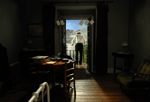The retrospective screening of Manoel de Oliveira’s Acto da Primavera alongside his latest film, The Strange Case of Angelica provided a great opportunity to see the evolution – or rather, reconstitution – of his cinema from documentary to narrative fiction. Indeed, by evoking images from his first film, Douro, Faina Fluvial in Isaac’s (Ricardo Trepa) desire to photograph the workers who still manually farm the valley, de Oliveira validates his continued preoccupation with film as a tensile medium for documentation, translation, and creation (the “in between-ness” described in the notes on Acto da Primavera). In hindsight, Isaac’s fascination with their dying way of life proves to be an underlying symptom for his own dislocation and estrangement. Hired by a prominent family to take photographs of their daughter Angelica on the eve of her death, Isaac soon becomes haunted by her, leading him further into a state of suspension between reality and image, the physical and spiritual, life and death. Framed within this seemingly banal tale of obsession and longing, The Strange Case of Angelica, nevertheless, provides de Oliveira with a broad canvas to explore his recurring themes of doomed love, the relationship between image and reproduction, and cultural extinction.
© Acquarello 2010. All rights reserved.
